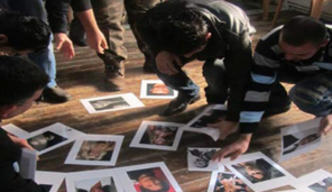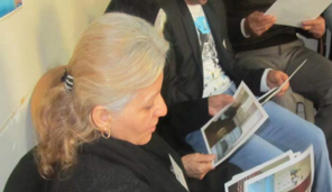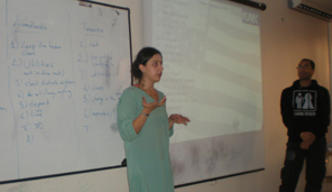RSC Turkey and Middle East
Cultural Orientation Program Profile
Date Established: The CO Program was established in July 2001.
Learner Population: The CO program is a regional program for a diverse mix of refugees from the Middle East, Africa, and South Asia.The program serves all ages, with participants' educational backgrounds ranging from postsecondary to little or no schooling. Many refugees have relatives in the U.S. and maintain contacts with these relatives via phone and the Internet.
Training Sites and Primary Caseload(s): Training takes place in Turkey (Istanbul), Lebanon (Beirut), Yemen (Sana’a and Aden), the United Arab Emirates (Abu Dhabi) and other locations as necessary.
Turkey: The learner population consists of Iraqis from different ethnic and religious backgrounds (e.g. Assyrian and Chaldean Christians, Shi'a and Sunni Muslims); Iranian Baha’is, Kurds, political dissidents, transgender cases, and religious converts; Uzbeks (usually with political persecution claims); Chinese Muslims; Afghans (mostly women at risk and family reunification cases); and other groups from South Asia and Africa.
Asylum seekers and refugees in Turkey are required to reside in provincial cities known as "satellite cities." Therefore, refugees need to travel to Istanbul for CO classes and pre-departure medical examinations. While in Istanbul, refugees are accommodated in a hotel paid for by ICMC and are reimbursed for their transportation and meal expenses. Trainers normally facilitate 3-day CO classes in Istanbul for 15-25 people per class for all approved refugees over the age of 14. There is also a Children’s and Youth CO class for children from between the ages of 8 and 14, and a daycare attendant for children between 0-7 years.
Lebanon: The current caseload is Iraqi. Since many of the refugees are working (whether legally or illegally), they are not willing to miss work or school to attend CO. Still attendance is over 90% of eligible participants, with a few parents of small children (usually the mother) not attending the second and third days of the session.
Yemen: There have not been any recent missions to Yemen where the caseload is primarily Somali women at risk, Iraqis, and a few Ethiopians.
United Arab Emirates: In recent years, CO has been conducted here for mixed groups of refugees (Iraqis, Syrians, Iranians, etc.). UAE caseload trainees tend to be able to secure good jobs with decent wages that allow them to rent adequate housing and own cars, send their children to private schools, and so forth. They have been almost all highly educated professionals with very high expectations, and most have had small children or school-age children.
Kuwait: CO is offered in Kuwait on an as-needed basis. The current caseload in Kuwait primarily consists of Iraqis.
Staff: The multinational CO training staff at ICMC's RSC have lived or worked in the United States or Europe and speak multiple langues including, English, Arabic, German, Spanish, French, and Turkish. Professional specializations include human rights law, gender studies, conflict and development, NGO management, early childhood education, social work, and international relations.
Course Particulars: Course length varies between 7 and 21 hours, depending on learner needs, with most students receiving 21 hours. Class size is usually 16 to 22 students, with smaller classes sometimes conducted. Children’s classes last for 3 days and are very small, with up to ten children or so.
Course content is based on the Objectives and Indicators with topics adapted to the interests and needs of each refugee group. Methodology is generally experiential and based on principles of adult learning but varies according to the cultural expectations and experiences of the group.
The aim of the team is to give refugees a realistic picture of resettlement's challenges and opportunities. Trainers emphasize the limits of the Reception and Placement program and encourage refugees to be pro-active in making their own resettlement experience successful.
Instruction is generally provided in English, with interpreters. Classrooms are designed to be inviting learning environments. All CO trainers are equipped with instructional material to support a learner-centered interactive environment.







